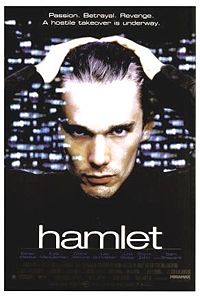Hamlet (2000)
Posted by J on July 22, 2008
It’s a sure bet. When we walk up and down the aisles of Blockbuster, we always think about shuffling off our  mortal coils. What with the fluorescent lighting and the TVs turned up to the highest possible volume. And then there’s the selection. For who would want to suffer through the slings and arrows of all the outrageously bad movies on the shelves, while being socially compelled to watch them with friends and relatives who would rather stare at a LCD screen for two hours than engage in productive activities and conversations?
mortal coils. What with the fluorescent lighting and the TVs turned up to the highest possible volume. And then there’s the selection. For who would want to suffer through the slings and arrows of all the outrageously bad movies on the shelves, while being socially compelled to watch them with friends and relatives who would rather stare at a LCD screen for two hours than engage in productive activities and conversations?
Worst of all, Blockbuster is owned by a corporation, which reminds us of the Denmark corporation, which our uncle now owns because of our dad’s death. Pity us. We were supposed to be in control!
Oh wait, we’re starting to think like this movie’s Hamlet, who is a depressed, urban techno-Hamlet. He is fond of video taping himself and then watching himself, at the same time that he’s being recorded by security cameras at the Denmark corporation’s headquarters. It’s all a little too postmodern for us. Hamlet splits himself into recorded images of himself, then gets even more depressed. Um, no thanks. We like our Hamlet reading a book in a castle, not videotaping himself in an urban jungle.
This Hamlet tries to make provoking statements about technology, but its unchanging tone will have you dashing to the countryside in no time. All of the city slicker characters in this Hamlet are depressed, narcissistic, or both. We already knew that about city slickers, so there is nothing new to learn here. The movie starts out on a down note and ends even farther down. The cityscape is imposing and alienating, the surveillance cameras are everywhere, and Hamlet and Ophelia can’t figure out the difference between attraction and love. It’s no wonder these two are thinking about killing themselves throughout the entire movie.
One of those statements about technology is that it shapes our motives and actions in ways we’re not aware of. A simple example in this movie is Hamlet’s trip to Blockbuster Video, in which he recites the famous “to be or not to be” speech. Prior to going there, Hamlet is contemplating a murder-suicide sure to make the national news. He’s gotten the idea from movies, so we are to infer. Thus he walks through the “Action” section at Blockbuster as he thinks about whether or not it would be good to kill himself after his shooting spree. But then he gets a better idea: “I’ll make a movie!” He’s a technowhiz with a Mac and handheld video camera, able — like all modern moviemakers — to project his terrible fantasies into his movies, thus showing them off to the world in pictures while being praised by others as a “great artist” (see Romans 1:32).
The one outstandingly bizarre choice in this movie, other than to use Shakespeare’s actual words, is to portray the ghost of Hamlet’s father as a ghost. In a movie that ceaselessly shows us grainy, black-and-white videos, the ghost is completely real. He’s corporeal. Hamlet can even give him a big hug. The rest of the movie is about showing how the self is fragmented by technology, infinitely split into digital versions of itself, but the ghost totally resists that theme. Of all the Hamlets, this modernized version is the one that can do the best job of portraying the ghost as an ambiguous figure by having him appear in a video recording, like one of those film versions of Bigfoot. It’s a blown opportunity to show us, the audience, one of Hamlet’s major problems: is the ghost genuine, or is it an evil spirit with malice to all as its intent? Simple issues like this weren’t thought through in pre-production, so this Hamlet has ended up as a cliched drama with a shoot-em-up ending and some great 17th century turns of phrase.
Entertainment: 3
Intelligence: 3
Morality: 1
Leave a comment